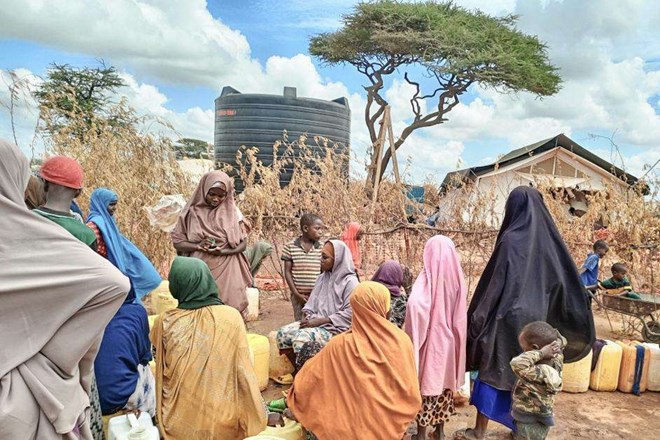
Thursday June 1, 2023

Dadaab (HOL) - Doctors Without Borders/Médecins Sans Frontières (MSF), a leading international medical humanitarian organization, issued a dire warning on Wednesday, stressing the urgent need for additional funding to prevent a looming health catastrophe in Kenya's Dadaab refugee camps.
The organization reported a cholera outbreak affecting 2,786 individuals and highlighted the imminent risk of other gastro-intestinal diseases. MSF urgently called upon donors and aid agencies to take immediate action to address the unsanitary conditions and overcrowding that have plagued the camps.
The Dadaab complex, situated in Kenya's North Eastern Province, comprises three refugee camps and currently shelters over 300,000 refugees, the majority of whom fled neighbouring Somalia. In recent months, the population in the camps has rapidly increased due to an extended drought in Somalia, exacerbating severe overcrowding and placing mounting pressure on existing services, including the availability of drinking water and latrines.
Hassan Maiyaki, MSF's country director in Kenya, emphasized the gravity of the situation, particularly in water, sanitation, and hygiene. He warned, "We have already seen the worst cholera outbreak in five years and the risk of other epidemics breaking out is high. If this occurs, it would [strip] medical capacity in the camps, with potentially catastrophic consequences."
The current cholera outbreak is linked to reductions in essential water and sanitation activities in the camps, including providing clean water, distributing soap, constructing and repairing latrines, and organizing waste management. Today, according to humanitarian organizations working in the camps, almost half the people living there have no access to functional latrines, leading to open defecation in and around the camps, which raises the risk of disease outbreaks.
The Kenyan Ministry of Health and various humanitarian agencies, including MSF, have conducted cholera vaccinations and health promotion campaigns to educate people on disease prevention measures. However, curbing the outbreak requires significant improvements to water and sanitation infrastructure.
"Despite our health promotion activities and vaccination campaigns, controlling this cholera outbreak remains [impossible] without [prioritizing] resources towards sustained preventive water, sanitation, and hygiene interventions," said Dr. Nitya Udayraj, MSF medical coordinator in Kenya. "If they are not improved in quality and scale, it is just a matter of time before we see other epidemics erupt in the camps, such as Hepatitis E."
Within the Dadaab complex, MSF operates a hospital in Dagahaley alone, MSF teams have reported more than 1,120 cases of cholera and two deaths since the start of the outbreak in November 2022.
MSF water and sanitation teams are currently trucking 50,000 liters [about 13,200 gallons] of drinking water each day to the outskirts of the camp. In recent weeks, MSF teams have built 150 communal latrines within the camps and on the outskirts, where around 9,000 newly arrived refugees have set up makeshift shelters in the surrounding desert. So far, MSF has provided around 1,000 households with plastic sheeting, mats, and liquid soap. But much more must be done to meet people's needs and prevent a humanitarian crisis.
The Kenyan government has announced plans to reopen a fourth camp, called Ifo 2, to accommodate new arrivals and alleviate the strain on resources in the existing camps.
"The relocation to Ifo 2 should be hastened to ease pressure on the existing camps," said Maiyaki. "All efforts to ease the overcrowding must include significant investment in the water, sanitation and hygiene sector to ensure a minimum standard of living for refugees in all the camps."
MSF calls on the international community, donors, and aid agencies to respond urgently to the unfolding crisis in Dadaab, taking immediate action to address the alarmingly unsanitary conditions and prevent the further spread of disease. In the longer term, MSF calls on the Government of Kenya and the UNHCR to find durable solutions for the refugees confined within the camps at Dadaab.
The three camps of Dadaab—Dagahaley, Ifo, and Hagadera—currently host more than 245,000 registered refugees, many of whom have lived in the camps for over three decades. The camps also host more than 124,000 unregistered refugees, including 67,000 who arrived in 2022.